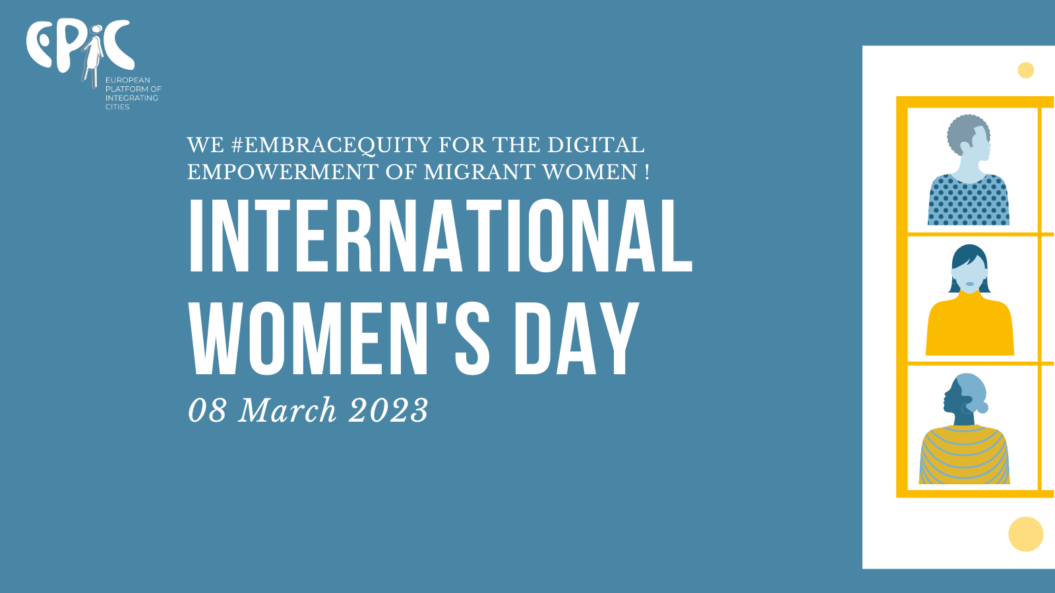
ON INTERNATIONAL WOMEN’S DAY 2023, WE #EMBRACEQUITY FOR THE DIGITAL EMPOWERMENT OF MIGRANT WOMEN !
This year’s theme for International Women’s Day 2023 is “DigitALL: Innovation and Technology for Gender Equality“, highlighting the crucial need for inclusive and transformative technology and digital education to promote gender equality.
Digital technology has transformed the way we live, work, and connect with each other. The rapid growth of digital technology worldwide is creating many opportunities and requirements for new skills, potentially involving re-skilling and upskilling, in the labour market (Buzi, Cattaneo, & Di Gregorio, 2021). Digital literacy is becoming more and more necessary in accessing the labour market, as 90% of jobs today require digital skills1. However, with only 17% of the ICT specialists being women2, a digital divide between men and women persists across Europe. This inequality particularly affects those with a migrant background, who face higher levels of gender stereotyping and discrimination, which reduces their motivation and access to digital training3. The digital gap further exacerbates their marginalisation and limits their access to education, employment and social services. Moreover, a study conducted by Sandra Ponzanesi, stresses that social networking platforms and other online activities not only enable women migrants to maintain the links with their home countries, but also facilitate connection to each other, promoting their emancipation (Ponzanesi, 2017).
Although there is a significant lack of data on migrant and refugee women’s participation in the digital labour market (Buzi, Cattaneo, & Di Gregorio, 2021), several studies have examined the digital divide that affects this population group. These studies look at the causes and the consequences of such discrimination and provide recommendations for addressing the issue leading to foster equity for migrant women.
The EU-funded project RIDE conducted a study across six countries in Europe, which highlights the barriers faced by migrant and refugee women in accessing digital technology and opportunities (Buzi, Cattaneo, & Di Gregorio, 2021). Challenges include language barriers, lack of recognition of qualifications, low education, and family and childcare responsibilities. To address these obstacles, digital training and education programs must be tailored to the needs of migrant women, offering language support and recognition of prior learning. Access to affordable and flexible childcare is also crucial to enable women to participate in digital training and work. Partnerships between employers, training providers, and migrant organisations can help to create opportunities for migrant women to enter the digital labour market.
A study conducted in 2018 by the non-profit organisation Accem in Spain reveals that while digital tools can offer an opportunity to migrant women to mitigate certain social inequalities, incomplete access to and/or limited knowledge of digital media can increase discrimination against them (Alegría, 2018). In particular, the study highlights that the lack of education on online media can increase the risk of the spread of fake news with xenophobic, sexist and racist content, causing emotional and psychological damage and potentially leading to violent acts. The study recommends several measures, including providing basic access to new technologies, reducing access costs, increasing aid, and promoting free public access points. Awareness campaigns are also suggested, using counter-narratives to combat online discrimination and xenophobia and reinforcing critical thinking about online content in schools. The report also calls for highlighting the contributions made by migrant women in the development of new technologies to encourage their participation in the digital world.
The European Union has launched several initiatives to bridge the digital divide and empower migrant women through technology, including :
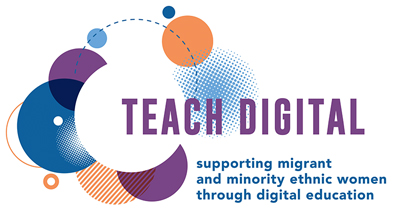
Teach Digital: Supporting Migrant and Minority Ethnic Women through Digital Education (Erasmus+, 2020- 2022) : the main goal of Teach Digital is to enhance the skills and motivation of educators who work with low-skilled, low-qualified women from migrant and ethnic minority backgrounds. The project aims to achieve this by providing cultural and gender-specific learning strategies and digital tools to make digital learning more appealing, significant, and beneficial to their professional and personal growth.
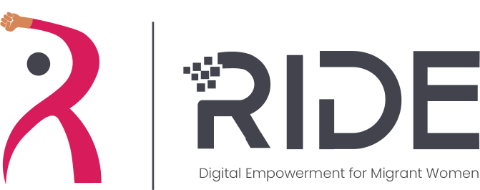
RIDE Project (Horizon 2020, 2018-2021): the project facilitated the inclusion of migrant and refugee women into the digital labour market by providing them with the opportunity to acquire new or improved skills in the digital sector. The project achieved this by offering customised training courses that equipped migrant women to begin working in the digital sector.
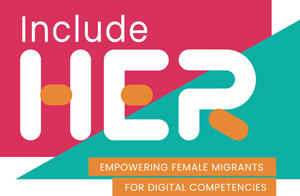
IncludeHer project (Erasmus +, 2020-2022) : the project focused on the development of digital competences of women with an immigrant background through training. The aim was to develop an open access online course for migrant women and to create a cooperation network.
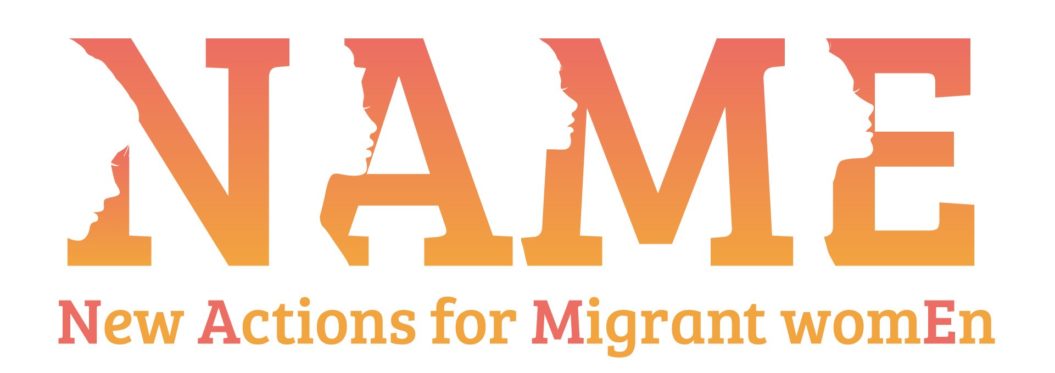
NAME | New Actions for Migrant Women (European Union’s Rights, Equality and Citizenship Programme, 2014-2020) : this project aimed at promoting the digital empowerment of migrant and refugee women in six EU member states. The project focuses on addressing the challenges that these women face in accessing digital technology and opportunities. It aims to develop innovative training programs and partnerships to facilitate access to the digital labour market, with the goal of promoting the social and economic integration of migrant and refugee women in Europe.

Chameleon project | Unlocking the Potential of Female Migrants as Entrepreneurs in the Digital Age (Erasmus +, 2020-2022) : the Chameleon project assists female migrants in establishing their own social enterprises to improve integration and equip them with the necessary skills to run a business in the digital age. Partners from the UK, Ireland, Cyprus, Portugal, France, and Italy contributed their expertise in social enterprise, the arts, migrant skills training, and program development for social good and change to the project.

NOW | New Opportunities for Women (Erasmus +, 2019-2021) : the project aims to encourage female role models and leaders within local communities. The project has created various educational materials and self-development tools, including video profiles, case studies, and inspirational stories, to assist women, particularly those from migrant communities, in embracing leadership roles in all areas of their lives
These initiatives aim to equip migrant women with the necessary skills and tools to navigate the digital world and overcome the challenges they face.
By working together and leveraging the power of technology, we can create a more inclusive and equitable society for all, including migrant women.
- https://www.teachdigital.eu/about/
- https://www.google.com/url?q=https://digital-strategy.ec.europa.eu/en/library/women-digital&sa=D&source=docs&ust=1678285617536233&usg=AOvVaw1EK0Z3kuSJTyHmPmuG3Xfc
- https://www.teachdigital.eu/about/
References :
Alegría, G. (2018). Impacto de las Brechas Digitales en la Población Extranjera. Retrieved March 8, 2023, from https://ec.europa.eu/migrant-integration/library-document/divides-impact-digital-divide-foreign-population_en
Buzi, A., Cattaneo, C., & Di Gregorio, S. (2021). RIDE: Research and Innovation in Digital Empowerment of Migrant Women. Migrant Women’s Perspectives on Social Inclusion Through Digital Storytelling. Retrieved from https://www.migrantwomennetwork.org/wp-content/uploads/RIDE-study-inclusion-digital-empowerment-migrant-women.pdf
European Commission. (2021). Women in Digital. Retrieved March 8, 2023, from https://digital-strategy.ec.europa.eu/en/library/women-digital
Ponzanesi, S. (2017). When technology empowers migrant women. Retrieved March 8, 2023, from https://erc.europa.eu/projects-figures/stories/when-technology-empowers-migrant-women
Teach Digital project (n.d.). About Teach-Digital. Retrieved March 8, 2023, from https://www.teachdigital.eu/about/